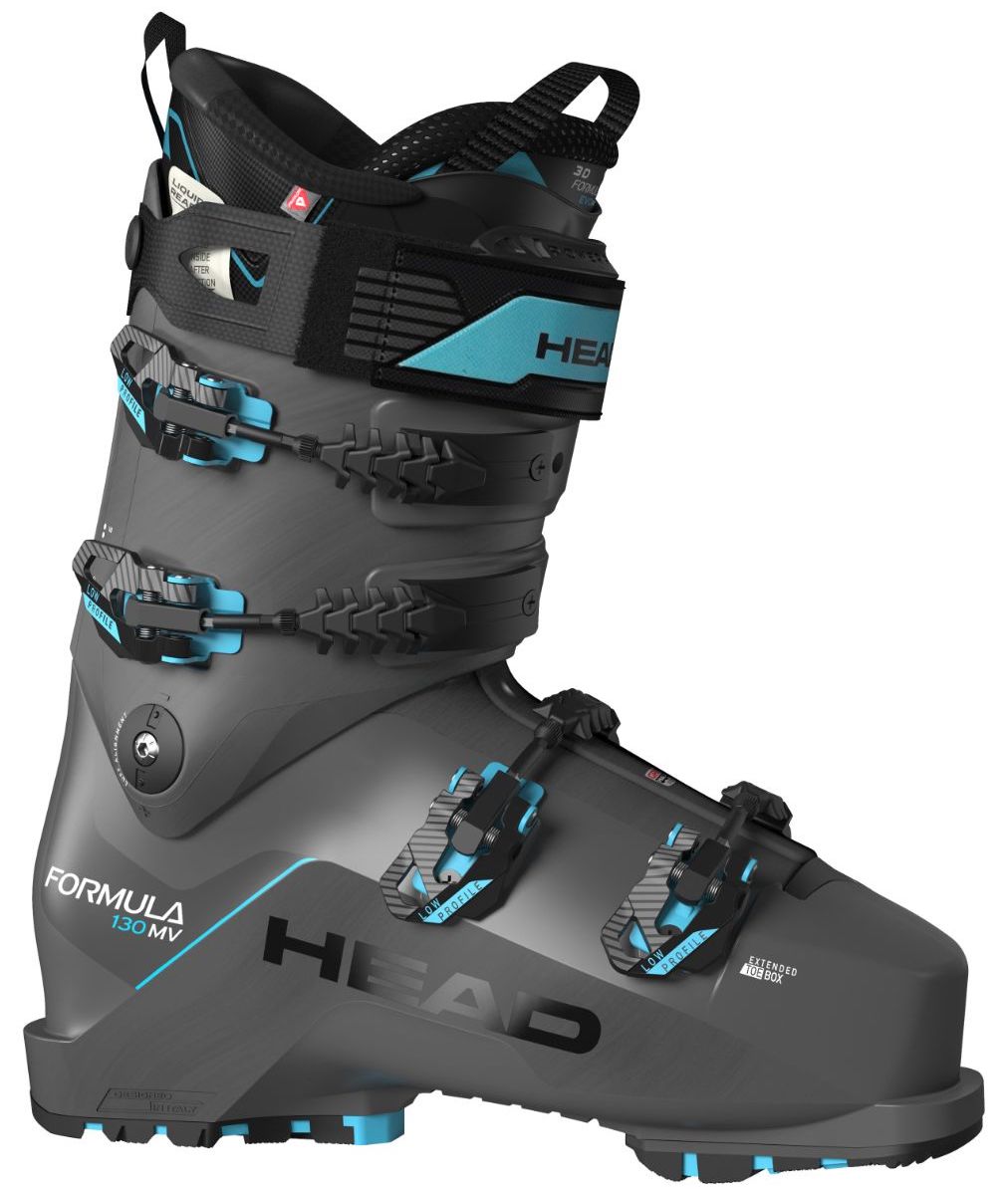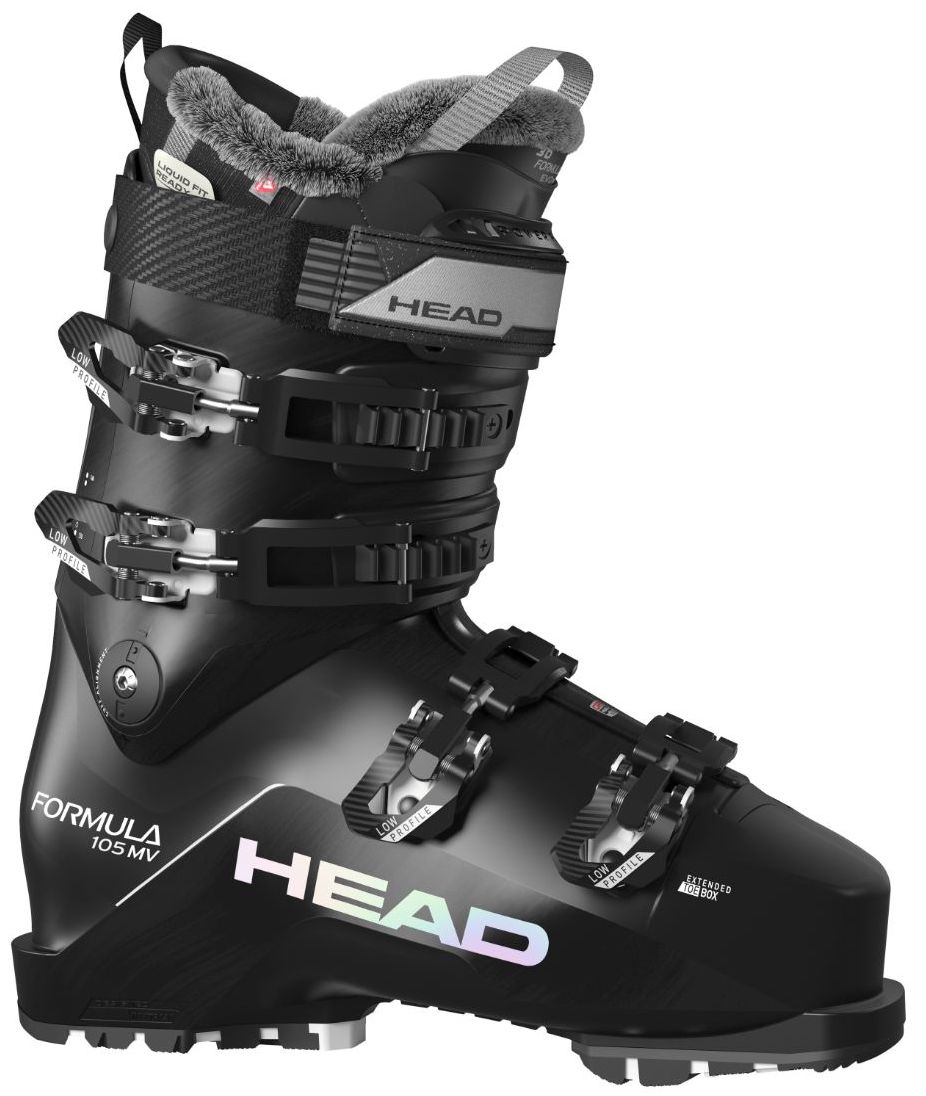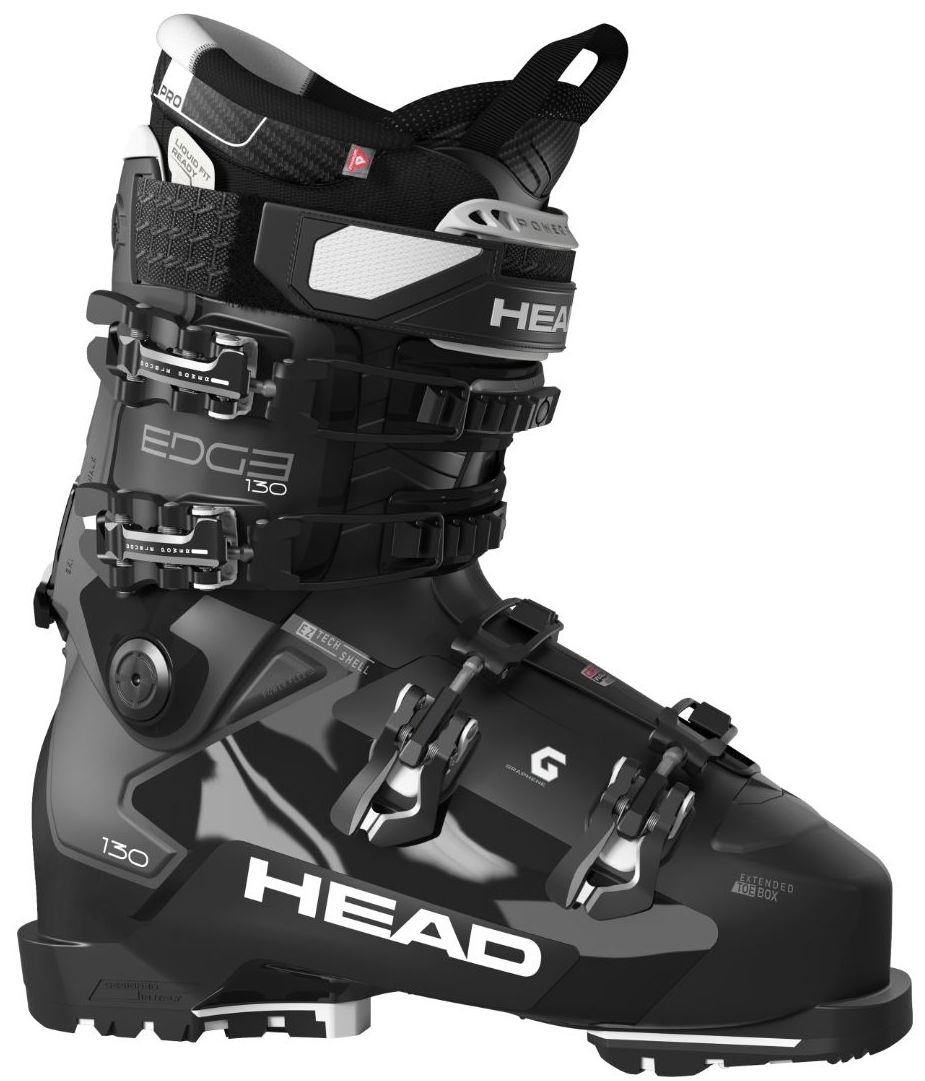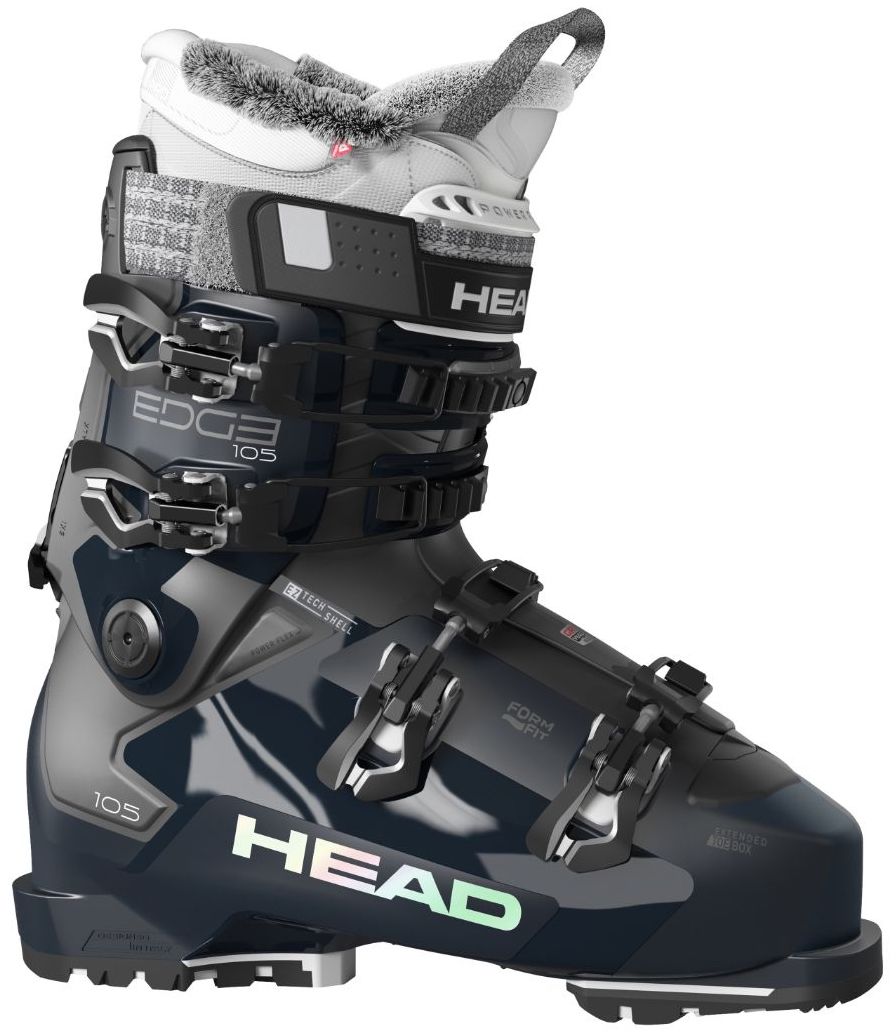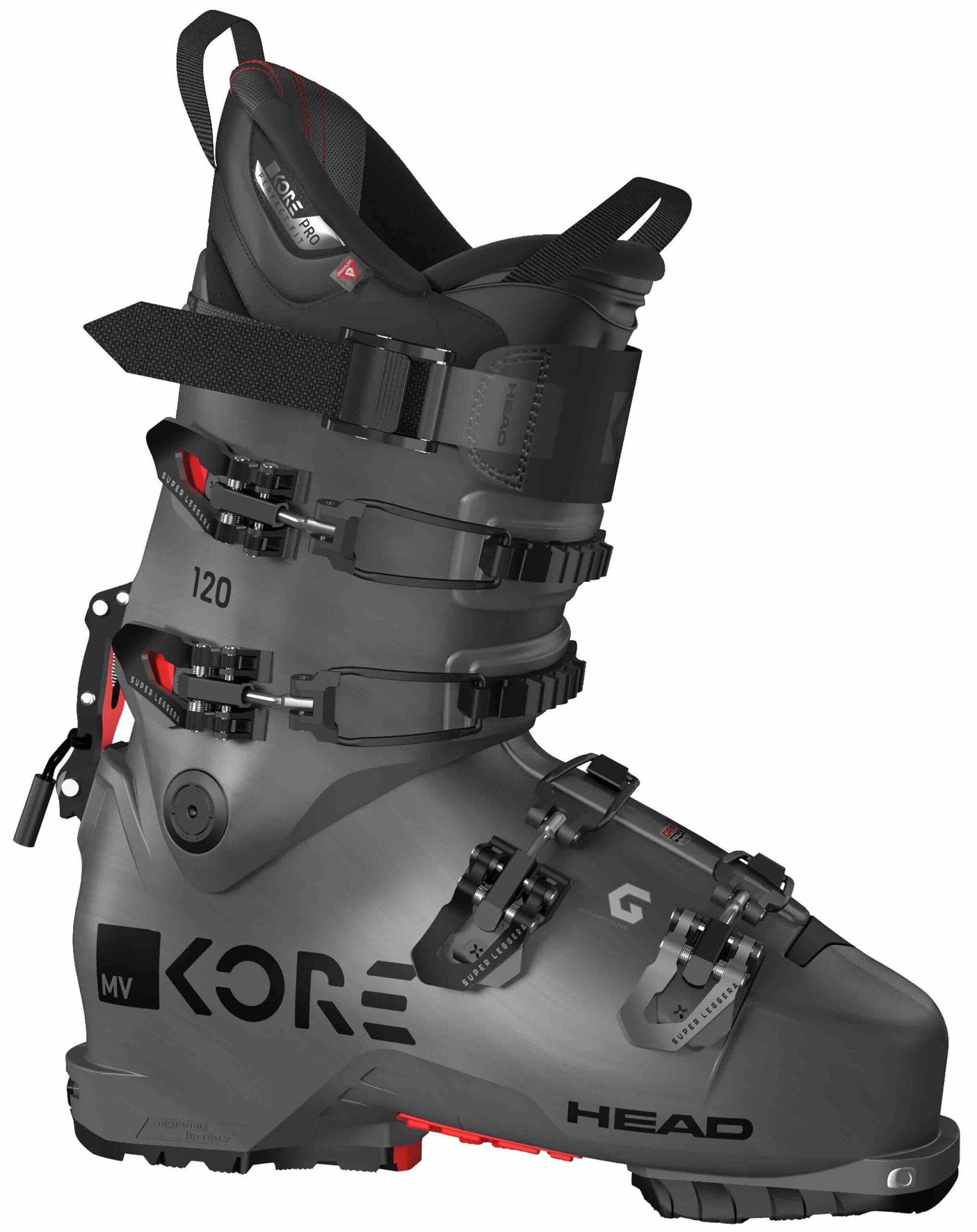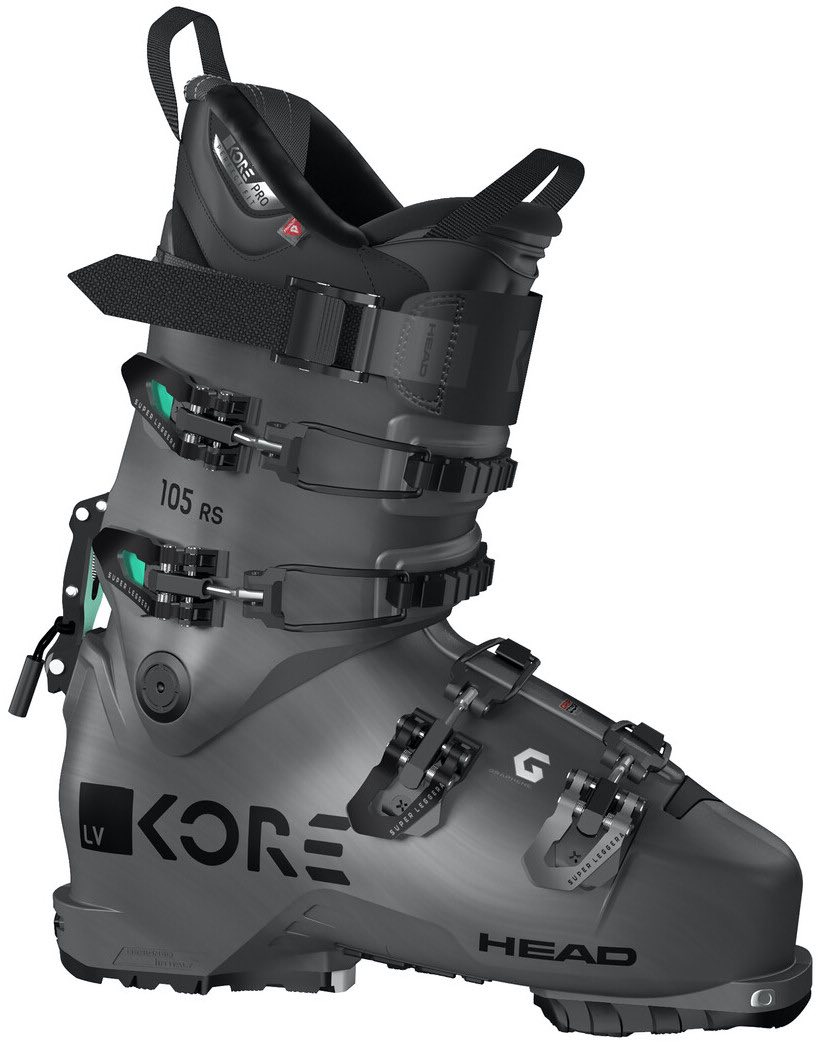Over most of Head’s storied history as a ski brand, lighter weight hasn’t exactly been top of mind. They’ve been better known for building battleships as opposed to skiffs. Two pivotal shifts, one global and one local, have made lightweight design a priority, if not the priority, at Head today. The global trend is to make all consumer goods lighter, across all categories, a phenomenon we refer to as Lighter is Better, or LIB. The local event was Head’s license to use Graphene, first manifested in its ski line with the debut of the women’s Joy series several years ago.
Graphene, which is carbon in a one-atom thick matrix, was bound to find its way into Head boots, as indeed it has with Nexo Lyt, the most thoroughly transformed of the new generation of lighter weight shells. By “transformed,” I mean not just dependent on material change to deliver improved behavior, or even to expect lighter mass to be of sufficient benefit by itself, but using lighter materials as an opportunity to change how a seemingly conventional boot (i.e., 4-buckle overlap, standard 4o/14o stance angles) reads and interacts with the snow.
If the new wave of lightweight shells is to bridge the gap between novelty and necessity, it will be because of designs like Nexo Lyt. The Graphene-infused Smart Frame shell is sculpted so it can absorb shock (to some degree) and generate rebound (to a greater degree). The sensation of snow feel is as intimate as wearing a moccasin. The quickness to the edge is fencer fast.
The 100mm (medium) last of the 2024 Nexo Lyt is close fitting out of the box, which is essential to its quickness and accuracy. If the fit around the heel and ankle should relax over time, a viscous fluid, called Liquid Fit, can be injected into an internal pouch that circumnavigates this area. Head doesn’t promote Liquid Fit as a point of sale necessity but a fit-refreshing technology. Able to be extracted as well as injected, Liquid Fit is a nifty fit option that will prove beneficial to all skier abilities. As of 2022, Liquid Fit became standard across Head’s boot collection, including the Raptor WCR, Formula RS and Formula series.
If any other shell or liner modifications (“mods” in bootfitter patois) are required, all the Lyt shells are easily heat-moldable. Rockered, Gripwalk soles are standard issue on the top of the Nexo Lyt line, which you’ll be thankful for the next time you face a long parking lot traverse.
Now that Head is comfortably LIB-centric, it has brought its collective imagination to bear on two categories where lightness has always counted, backcountry and women’s boots. Even though BC boots belong to a genre I rarely visit, curiosity compelled me to essay the Kore 1 when it debuted. Despite its extraordinarily featherweight design and relatively soft flex (in a 130), it remained supportive when I drove into it. Its quickness to the edge rivals that of any recreational Alpine boot. For 2023, the Kore collection was completely revamped and sub-divided into two versions, with the highest flex indices (130 and 105 W) outfitted with a 98mm last, and a 120, 110 and 95 W in a 100mm volume.
Head’s women’s boot collection definitely benefits from the trans-gender (old-fashioned meaning) focus on lighter weight. In 2024, women have a choice of Nexo Lyt (100mm) or Edge Lyt (102mm) shells in an assortment of flexes. All women’s boots come equipped with Form Fit moldable shells, adjustable cuff aperture and Liquid Fit liners that are of particular value to women with low-volume feet who don’t want to absorb the shock of an injected inner boot’s price tag.
As an Austrian brand, Head is ultra-focused on winning World Cup races, an intensity that may have even gone up a notch since Head’s hands-on owner, Johan Eliasch, was elected president of FIS, Alpine racing’s governing body. Head’s Raptor series of no-holds-barred race boots has a well-deserved reputation for brute power that may have hindered its appeal to comfort-loving Americans.
In 2022, Head re-built its Raptor WCR series inside and out, and extended its virtues to a new batch of nearly-race boots called Formula. Both the Raptors and Formulas boast a bevy of new features, including an extended toe box, a new cuff alignment that’s more precise and stable, and re-positioned buckles on the lower shell that won’t snag the snow at maximum angulation. Racers will appreciate the Raptor WCR’s more upright (9o) stance, and boot technicians will like the new WCR boot board because it has no varus correction that has to be ground away.
The Formula boots (introduced two years ago) come in two lasts, 98mm for the Formula RS series, and 100mm for the Formula series. Both use a damper PU formula derived from Head’s Raptor research that has a more gradual flex and measured rebound. Both the Raptors and Formula models are ready to receive Liquid Fit, Head’s clever, injected goo that fills a pocket around the heel and ankle as needed to deliver a firm grip in this critical area. All Formula models except the 100 and 85 W come with GripWalk soles installed, although the no-frill Raptor WCR models have either monoblock shells or use a sliver of a flat, replaceable sole.
The big news at Head boots in 2023 was a full make-over of its Kore series of backcountry models. Head’s mastery of Graphene’s possibilities creates a shell and cuff that are light enough for touring but substantial enough for everyday, in-bounds adventures. All the required elements of a climbing boot are here: a ski-hike mechanism that delivers 53-degrees ROM, featherweight alu buckles, lockable buckle bails, a treaded sole and low-tech inserts. The latest Kore liners have added reinforcement at the cuff and around the heel, built around 98mm and 100mm lasts derived from Head’s Raptor and Formula series. All five Kore models use GripWalk soles that are compatible with Alpine or pin bindings.
The headline news for 2024 is the revival and revamp of Head’s wide-lasted (102mm@26.5) Edge series, which retains its signature Hi-Top lower shell, that extends well into the upper cuff, creating a unique connection between the two components that cradles the skier in a supportive stance. Also high on the list of Edge’s unique benefits is its EZ Tech Shell, that practically slips on and off by itself. I was at Head (during the last Ice Age), when the EZ-On design was first concocted; in fact, I was the one who proposed the EZ-On name for the series. (Product Manager Alberto Cenedesi called the new boot, “Eidos,” Greek for “idea.” It was one of the few arguments I won while at Head.)
Another EZ-On related tidbit: While I was recruiting Jonny Moseley for Head’s freeride team, my European counterparts were blessed to discover 16-year-old phenom Jon Olsson, an astounding aerialist who competed in… the effing EZ-On. Pardon the digression.
It bears mention that the newest Edge models aren’t just buckets to contain the foot: they put the skier in a balanced stance and the steering properties – thanks to the Hi-Top shell – are superior to most high-volume boots. Seniors who struggle with their boots will be amazed by their ease of operation.

